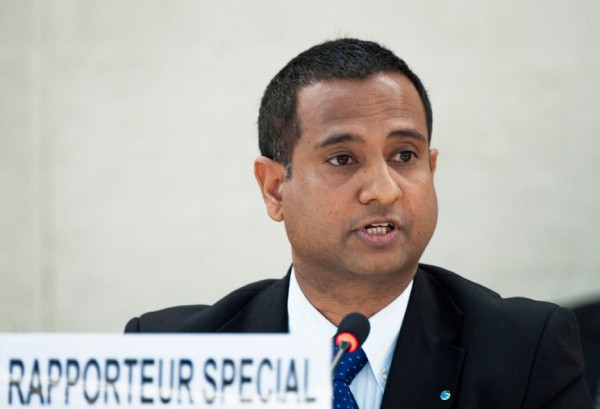11 February 2013 – United Nations human rights experts today called on Iran to immediately release two leading opposition figures and their family members who remain under house arrest, as well as hundreds of other prisoners of conscience, ahead of the country’s June 2013 presidential elections.
“I urge the Iranian Government to immediately and unconditionally release the two opposition leaders and their family members, and to end all restrictions on their movement and legally protected activities,” the Special Rapporteur on the situation of human rights in Iran, Ahmed Shaheed, said in a news release.
According to the news release, former presidential candidates Mehdi Karoubi and Mir Hossein Mousavi, as well as Mr. Mousavi’s wife, Zahra Rahnavard, have been kept “incommunicado” since February 2011, following a legally-permitted rally in which they voiced solidarity with protesters in Egypt’s Tahrir Square. In addition, Mr. Mousavi’s daughters were also reportedly detained today after speaking out against their parents’ house arrest.
Mr. Shaheed noted that as a party to the International Covenant on Civil and Political Rights, the Iranian Government was “obliged to protect the civil liberties of all its citizens,” including the rights to be protected against arbitrary detention, to be informed of any charges against them, to be given access to legal counsel, and to face an independent and impartial tribunal.
Adding his voice to the appeal, the Special Rapporteur on the rights to freedom of peaceful assembly and of association, Maina Kiai, also reminded the Iranian authorities of their international obligations guaranteeing the rights to free expression, free association and peaceful assembly.
“Such rights are essential components of democracy and are all the more relevant in the context of Iran’s upcoming presidential elections, to be held next June,” Mr. Kiai said.
“It is of the utmost importance that members of civil society, including the media and human rights defenders, as well as political activists, be given greater space to avail themselves of these rights,” he added.
The Special Rapporteurs further urged Tehran to release hundreds of other prisoners of conscience detained for “peacefully exercising their rights to freedom of opinion and expression, or freedom of association and assembly,” especially as the country heads towards elections.
The last Iranian presidential elections in 2009 were marred by a string of protests and dubbed by the international press as the Green Revolution, during which demonstrators flooded the streets of Tehran in support of opposition politicians Mehdi Karoubi and Mir Hossein Mousavi.
Mr. Shaheed underscored the need for the Government to ensure the peaceful occurrence of the upcoming elections and to guarantee the freedom of Iranian citizens to participate in the democratic process.
“I call on the Government to facilitate a transparent and open environment for the election by releasing leaders and allowing the media to effectively and independently report, without being harassed, threatened or arrested,” he stated. “Continued restrictions of this kind will undermine the inclusiveness and fairness of the future presidential elections.”










